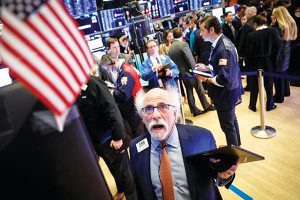Bloomberg
US equity futures wavered and Treasury yields edged higher after the Federal Reserve signaled it would risk a recession to beat inflation, precipitating a wave of monetary tightening from other central banks.
Contracts on the S&P 500 fluctuated after the benchmark’s tumble when the Fed unleashed a third consecutive 75 basis-point hike and indicated another of the same magnitude could be in store for November.
The two-year Treasury yields climbed as high as 4.11%, deepening the yield-curve inversion that signals economic headwinds.
The Fed gave its clearest signal yet that it’s willing to tolerate a recession as the necessary trade-off for regaining control of inflation, with officials signaling a further 1.25 percentage points of tightening before year-end.
Switzerland, Norway and Britain followed with rate hikes of their own as officials rush to get to grips with rampant price increases.
“The Fed is engineering a hard landing — a soft landing is almost out of the question,†Seema Shah, chief global
strategist at Principal Global Investors, wrote in a note following the Fed decision.
“Powell’s admission that there will be below-trend growth for a period should be translated as central bank speak for recession. Times are going to get tougher from here.â€
Stocks in Europe plunged more than 1%, led by rate-
sensitive sectors including
real estate, technology and construction. The Bank of England delivered a second consecutive half-point hike to quell price pressures.
Even so, the move to 2.25% wasn’t as big as some were expecting, and the pound pared its rise against the dollar. The gilts 10-year yield climbed.
The Swiss National Bank matched the Fed by raising interest rates 75 basis points to bring borrowing costs above zero for the first time in almost eight years.
Norway’s central bank, among the first in the rich world to start raising rates last September, lifted its key interest rate by a half point and signalled that its tightening may be nearing an end.
The yen rose after Japan’s first intervention since 1998 shored up the currency’s 20% slide against the dollar this year. In contrast to the Fed, the Bank of Japan stuck steadfastly to its rock-bottom interest rate policy on Thursday. A gauge of the dollar reversed gains.
Futures on the S&P 500 were little changed in New York. Futures on the Nasdaq 100 fell 0.2%. Futures on the Dow Jones Industrial Average were little changed. The Stoxx Europe 600 fell 1.1%. The MSCI World index fell 0.2%.
The Bloomberg Dollar Spot Index fell 0.2%. The euro rose 0.3% to $0.9864. The British pound rose 0.3% to $1.1304. The Japanese yen rose 1.7% to 141.59 per dollar.
The yield on 10-year Treasuries advanced two basis points to 3.55%. Germany’s 10-year yield was little changed at 1.89%. Britain’s 10-year yield advanced 11 basis points to 3.42%.
West Texas Intermediate crude rose 1.5% to $84.22 a barrel. Gold futures rose 0.2% to $1,678.50 an ounce.
 The Gulf Time Newspaper One of the finest business newspapers in the UAE brought to you by our professional writers and editors.
The Gulf Time Newspaper One of the finest business newspapers in the UAE brought to you by our professional writers and editors.
